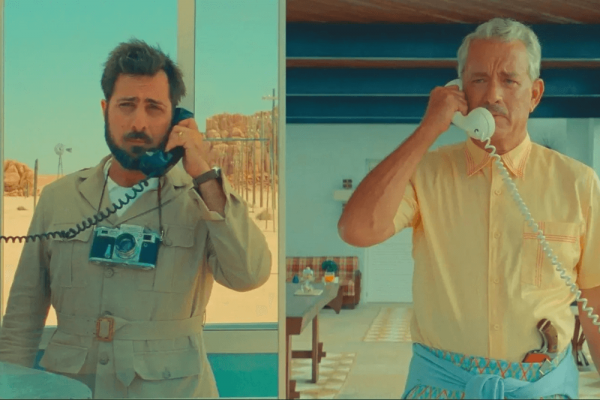Augie Steenbeck doesn’t want to talk to his father-in-law. The photojournalist (played by Jason Schwartzman) had hoped to leave his triplet daughters with their grandfather Stanley Zak (Tom Hanks) for a few days, so that he and oldest son Woodrow (Jake Ryan) could attend a meeting of the Junior Stargazers. And Augie certainly didn’t want to have to deal with the fact that he still hasn’t told the children about their mother’s death by illness, a full three weeks earlier.
But when an inexplainable automobile failure leaves him stranded in Asteroid City, Augie has to place the call.
“You never liked me, did you?” Augie asks.
After an indecisive pause, Zak answers, “I never… loved you.”
“You always thought I wasn’t good enough for her,” Augie interjects, so quickly that he talks over Zak’s identical words.
“We’re saying the same thing, yes,” Zak concedes.
Even a sloppy director could throw together the above scene and score some easy laughs. But in the Wes Anderson movie Asteroid City, the conversation is an immaculately constructed comic tragedy, one of many in the film. Working with co-writer Roman Coppola, Anderson adds new depth to his catalogue — movies about emotionally-scared geniuses, sad little know-it-alls whose excellence in obscure hobbies bring no satisfaction. That dissatisfaction only intensifies when these know-it-alls witness the sudden arrival and departure of a flying saucer.
In this and the many other plot threads in Asteroid City, Anderson buries ineffable grief under layers and layers of artifice. With its over-saturated pastel desert landscapes and impeccably blocked compositions, Asteroid City foregrounds inauthenticity. These false facades allow characters to bury their feelings, as when Augie finally tells his kids about their mother’s demise. “Let’s say she’s in heaven,” he declares. “Which doesn’t exist for me of course but you’re Episcopalian.” Their language of faith is as steady as the sets that surround them, but just as unconvincing.
Within these ornate falsehoods, the characters long for immanence, struggling to give meaning to the beautiful nothing that is their lives. Sometimes, that meaning comes cheap, as in the answers that Steve Carrell’s costumer service-focused hotel manager gives to every complaint (“Of course, I understand” he recites, lacking all understanding). Sometimes, that meaning comes at a great cost, as when the U.S. military detains the citizens of Asteroid City to study the alien invasion.
But more often than not, the answer never comes at all. No matter how many times Augie speaks to an expert, a manager, or an actor, he gets no answers, no explanations for the seemingly random worlds in which he exists. It’s only one more display, one more performance, one more set.
This tension between spiritual longing and beautiful artifice should seem familiar to anyone who’s set foot in a church. Many of us have worked to have faith like a mustard seed (Matthew 17:20-21), to possess the “the assurance of things hoped for, the conviction of things not seen,” we find our spiritual journey filled with more questions than confessions (Hebrews 11:1). We sometimes cover these doubts with declarations of faith, but our words are as stilted as Augie’s conversations with his kids, as flat as the landscapes where the Stargazers search the skies.
We fail to remember the lesson author Anne Lamott was taught by her pastor Father Tom, as recorded in a chapter from her book Plan B: Further Thoughts on Faith. “[T]he opposite of faith is not doubt, but certainty,” she writes, paraphrasing Paul Tillich. “Certainty is missing the point entirely. Faith includes noticing the mess, the emptiness and discomfort, and letting it be there until some light returns.”
Like most of us, Augie doesn’t want emptiness or discomfort. And we certainly don’t want any mess, not in the perfectly crafted Wes Anderson world where they live. And yet, emptiness, discomfort, and mess all appear, invading like an alien who won’t explain its intentions.
It’s in these moments that Asteroid City imagines something even richer than its design: human emotions. We see that in the aforementioned phone call between Augie and Zak. As soon as Augie dials, Anderson splits the screen vertically, showing the Zak residence on the right-hand side. Both sides of the frame are masterclasses in composition, with whip pans occurring on the left and a steady oner on the right. It’s all blocked and staged with such precision that the actor’s performances feel just as static. That is, until Augie begins to explain himself.
“The time is never right,” he declares, as justification for why he didn’t tell his kids about their mother’s death. After letting the silence sit for half a beat, Zak answers. Anderson changes to profile shots on both sides of the split screen, giving the impression that Zak and Augie are staring each other in the face.
“The time is always wrong,” Zak responds. Hanks growls the answer with something that’s neither really menace nor compassion, but something in the middle, something messy. Surprisingly, lack of clarity in Hanks’s line-reading doesn’t disrupt the precision of Anderson’s direction. Instead, it enhances it, giving meaning to Zak’s advice that presence matters more than perfection.
For all of its outstanding visuals, it's these breakdowns in design that stand out most in Asteroid City. When the meaning isn’t clear and there’s no satisfactory answer can be found, simply admitting that you don’t know, simply being present, is the most amazing act of faith.
Got something to say about what you're reading? We value your feedback!







